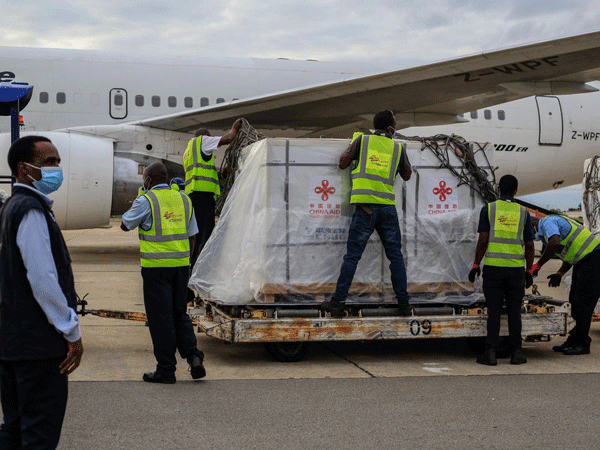
A CHORUS of activists are calling for changes to intellectual property laws in hopes of beginning to boost COVID-19 vaccine manufacturing globally, and addressing the gaping disparity between rich and poor nations’ access to coronavirus vaccines.
Jessica Glenza
The US and a handful of other wealthy vaccine-producing nations are on track to deliver vaccines to all adults who want them in the coming months, while dozens of the world’s poorest countries have not inoculated a single person.
Activists have dubbed the disparity a “vaccine apartheid” and called for the world’s largest pharmaceutical companies to share technical know-how in an effort to speed the global vaccination project.
“The goal of health agencies right now is to manage the pandemic, and that might mean not everyone getting access — and not just this year — in the long-term,” Peter Maybarduk, director of Public Citizen’s access to medicine programme, said.
“If we want to change that, if we’re not going to wait until 2024, then it requires a more ambitious and different scale of mobilisation of resources,” Maybarduk said. Right now: “It’s not even clear the goal is to vaccinate the world”.
The pressure to get more vaccines to poor nations has also weighed on the Joe Biden administration, which is now considering whether to repurpose or internationally distribute 70m vaccine doses. After outcry, the US has shared 4m AstraZeneca vaccine doses with Canada and Mexico.
“There’s no question poorer countries are having a hard time affording doses,” Howard Markel, a pandemic historian at the University of Michigan School of Public Health said. “Even if they were at wholesale or cost there are a lot of different markups.”
- Chamisa under fire over US$120K donation
- Mavhunga puts DeMbare into Chibuku quarterfinals
- Pension funds bet on Cabora Bassa oilfields
- Councils defy govt fire tender directive
Keep Reading
As it stands, 30 countries have not received a single vaccine dose. Roughly 90m vaccine doses expected to be distributed through Covax, the global alliance to distribute vaccines to poor countries, have been delayed through March and April by a COVID-19 outbreak in India. In Europe, rising COVID-19 cases and a slow vaccination campaign have also prompted vaccine export controls.
Beyond existing vaccine supply, many activists see a bigger fight in patent laws, and are drawing on experience advocating for greater access to antiretroviral drugs for HIV.
“More is possible than we believe,” Maybarduk said. “It was assumed Aids drugs could not be produced for less than US$10 000 per person per year, right up until the moment they could, and they were produced for US$1 per person per day.”
Similarly, Maybarduk said the technology for COVID-19 vaccines, along with other supplies, should be shared among the countries of the world. Activists have used Moderna as a key example of the leverage the US government might have, if it chose to use it.
Though popular shorthand often refers to it as just the Moderna vaccine, it was developed in partnership with the US National Institute of Allergy and Infectious Disease (NIAID). American taxpayers provided $6bn in late-stage development funds, in return for potential vaccine doses. It was also tested on Americans, who volunteered for research across 99 research sites.
“It is literally the people’s vaccine,” said Maybarduk.
Part of the proposal from activists focuses on a petition to temporarily suspend intellectual property laws governing World Trade Organisation member States. Suspending those patent laws could urge companies to share technology, they argue, and better protect the whole world from emerging variants that can blunt vaccine efficacy.
“This is a classic case where you have an industry that has a very direct stake in protecting itself, and there’s very little understanding among the public of how much is at issue,” Dean Baker, an economist and co-founder of the Center for Economic and Policy Research said. Activists argue pharmaceutical companies should share production know-how, and be appropriately compensated.











